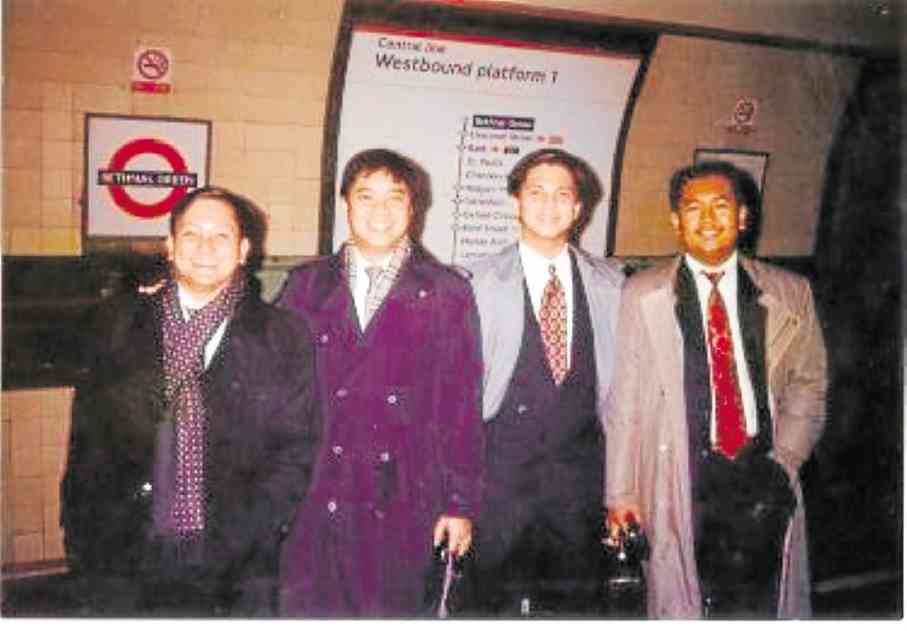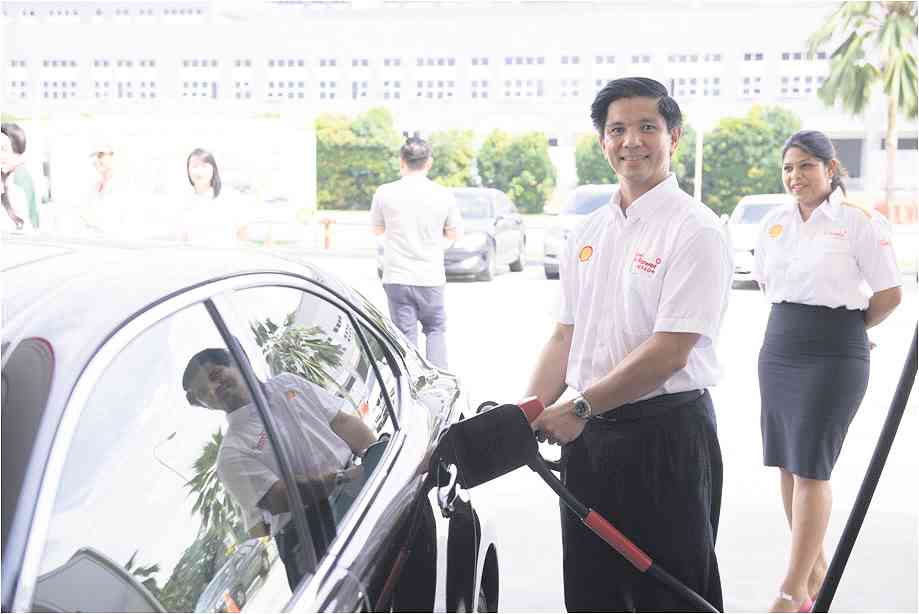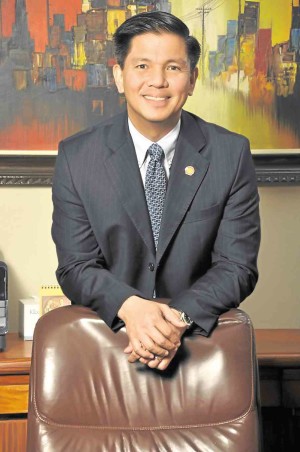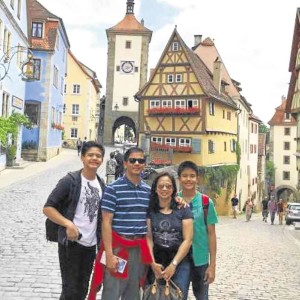The making of a Shell president
Landing a job at Pilipinas Shell Petroleum Corp., the only company he applied to, was a dream-come-true for then fresh graduate Cesar G. Romero.
Like a young man who just finished his military training, Romero recounts, all he wanted when he completed his degree in mechanical engineering at the University of the Philippines in 1987 was to be in the front line. And front line for a hard-core engineer like him, he says, means getting his hands dirty working in a plant.
Impressed by the state-of-the-art facilities he saw and the “nice professional” people he met when he visited Pilipinas Shell’s refinery in Batangas when he was in college, Romero was convinced Shell Tabangao was the place for him to start a career and satisfy his craving to work with machines.
He thought he’d be staying with Shell for only two to three years before moving on to try other jobs in other companies. Never did it cross his mind then that he’d be staying with the oil company for a very long time—30 years now and still counting—and that he would become the country chair of Shell companies in the Philippines and president of Pilipinas Shell Petroleum Corp., the posts he has been holding since November last year.
He is also part of Shell’s global retail leadership team, which sets policies, strategies, business targets and capital allocation for the operations of the company’s worldwide downstream retail business.
But the journey to where Romero is now was far from easy, he says. It was, in fact, long and circuitous.
First job
In his first three years at the Shell Tabangao refinery, Romero was transferred three times to three different jobs. On his fourth year, he was uprooted from hard-core engineering work at the plant and moved to sales, which to him, was a very drastic shift. After a year, he was transferred again to marketing and, later, to supply.
From local operations, barely five years after joining the company, he was transferred to London to be part of Shell’s scenario planning group that covered Shell’s global operations. And two years after, he was made to move again from global strategy to regional and was assigned to the company’s East Asia office. He had a brief stint back in the Philippines a few years later to take care of the retail business in the country and the North Pacific cluster only to be brought back to London as vice president for downstream management consultancy, concurrent with the role of business assistant to the executive director of Shell’s global downstream business.
On his 20th year with the company, he was made vice president for supply in East Asia based in Singapore and two years after, he became vice president of retail sales and operations for the region. He became part of the Shell global retail leadership team and prior to his appointment as country chair of Shell companies and president of Pilipinas Shell, he assumed the role of vice president for the global retail network.
“It was very stressful, especially during the first two to three months in every new job. Imagine the drastic changes? From talking to machines, I was made to talk to people. From talking to people, I needed to talk to computers. From the plant, to the roads and retail stations to offices here and overseas,” Romero recounts.
He admits there were times he got confused and doubted his capability to do his jobs properly. “I thought they had kept on transferring me to different jobs because I wasn’t doing my jobs well, although those transfers were always accompanied by promotion and salary increases.”
He realized later that every move had a purpose and every new job assigned to him was part of his preparation for bigger things ahead.
No master plan
“I don’t have a career master plan. I just work hard, give my best in every job I am given and make sure there is always room for growth for me,” he says. And it looked like he didn’t need a master plan as it was the company, itself, that seemed to have plotted his career direction.
His first job at Shell Tabangao, as refinery engineer, involved maintenance scheduling. He was tasked to take care of work and maintenance schedules of the machines at the refinery. “It was difficult as it covered a lot of things—from light bulbs to big compressors.”
On his second year, he was moved to machines shut down scheduling and, on the third year, he became a rotating equipment engineer. It was during his last year at the plant when he was made to undergo scuba diving training as he also had to supervise work at Shell’s submersible pumps.
The first three jobs in his first three years allowed him to practice engineering and exposed him to oil refinery operations. It also instilled in him a “certain discipline on how to think,” he says.
Knowing the customers
“I am an engineer, why are they assigning me to sales? Why am I being detached from the job that I am supposed to do and uprooted from the place where I should be?” That was Romero’s initial reaction when he was removed from the plant and made a sales representative to cover 25 retail stations in Quezon City.
He later realized the drastic shift was not punishment. It was done to make him know the company’s customers more, learn their needs and concerns first hand. He did his job, made sure he did it well and he came to like it.
“I never thought I’d enjoyed dealing with people that much,” he says, adding that it was only then that he realized he was also good in sales and in dealing with people.
The next assignment didn’t surprise him anymore. He was transferred to supply, in charge of sourcing materials for the refinery, particularly hydro carbons, and of ensuring they were used in the most efficient way.
“My mission then was to find the materials at the lowest possible costs, making decisions of whether to buy the materials or to produce them ourselves,” he says. This job, he adds, honed his logical thinking skill.
After his fifth year in the Philippine operations, Romero was uprooted and moved again, this time to London to become part of Shell’s scenario planning group. It is a group of people who look at possible scenarios of how the world may develop over the next 20 years or so.
“For example, the emergence of renewables and hybrid cars, we already picked these up as early as 1995. It is not making predictions, it is more of looking for possible world scenarios that would affect us. We do that so Shell will not be blindsided by future developments and will be able to do contingency planning, make changes in the refinery process and come up with offerings that will fit future needs,” he says.
The job broadened Romero’s perspective and enabled him to see the bigger picture. It exposed him to Shell’s global operations and made him think global when taking part in formulating strategies.
From global to regional
The next assignment was still big in scope but more focused on the region and closer to the ground, as he puts it. He became strategy manager for Southeast Asia plus China, New Zealand and all the way to Oman.
“After two years, the company thought I had enough of strategizing and brought me back to the Philippines. I became sales manager for retail and, later, district manager for Metro Manila, which puts me in charge of 350 retail stations,” he says.
From 350 stations, the coverage expanded to more than 1,000 when he became a general manager. He was later made cluster manager for North Pacific, based in the Philippines but covering areas like Guam and Saipan.
In 2004, he was assigned back to London to lead a global project for lubricants that involved “macro distributorship,” a business model he introduced and which is still used by Shell in several countries.
Still in London, in 2007, he became head of Shell’s “downstream consulting,” which is Shell’s internal consulting group. After the second year, he was again relocated to Singapore and served as vice president for supply for East Asia and, later, as vice president for retail sales and operations, accountable for the operating profit or loss of Shell retail stations in Southeast Asia, South Asia and China.
Recently, he was named vice president of the global retail network, responsible for the management and capital investment associated with the global retail business’ physical assets worldwide. “This job covers network planning, real estate, gas station construction, facilities maintenance, soil and groundwater services and HSSE (health, safety, security and environment).
By then, he had gone full circle and back to engineering. In November, after having been all over, Romero was named Shell’s country head for the Philippines and president of its local unit, thus bringing him back home.
And that was how a top Shell management honcho was made.
Well-rounded, grounded
“My learnings in the past 30 years were not limited to technical and business aspects. I also came to learn and understand various cultures, and had practical lessons on social graces, like wine pairing and choosing the right attire for different occasions,” he fondly recalls. “That’s Shell’s way of developing its people and it is one of the things that make Shell unique and special.”
The system works both ways, he explains. “People get to see and experience all aspects of the company’s operations and gain knowledge and skills along the way, while the company gets to know its people’s strengths, weaknesses and where they need further development,” he adds.
“There was no management training program in the company at that time, but a large part of who I am now, professionally and personally, I owe to Shell.”
In between the numerous jobs he handled, the trips he had to make and the many times he had to be posted overseas, Romero managed to pursue and complete his master’s degree in business administration at the University of Michigan in the United States.
All these, he says, he was able to do well without losing his focus, largely with the help of his wife, Michele. “I have a very capable and supportive wife. She’s doing a great job raising our kids (one 15-year-old and the other 13, both boys) and managing the household wherever we are. That allows me to focus on work.”
That counts a lot especially now that Romero is wearing different hats in the company. Under him, in the Philippines alone, are about 4,000 people, including those working in Shell Business Operations (SBO), an offshoring unit that services Shell in the United States. Handling such a big number of people can be tricky given Romero’s style of management.
“I am a very situational manager. I believe there is no single formula that can be applied uniformly to everybody. Different people need different approaches on different occasions. My general tendency is to be supportive to them as I believe that people are generally good if they’re in line with the vision. All you have to do is enable them and provide guidance.”



